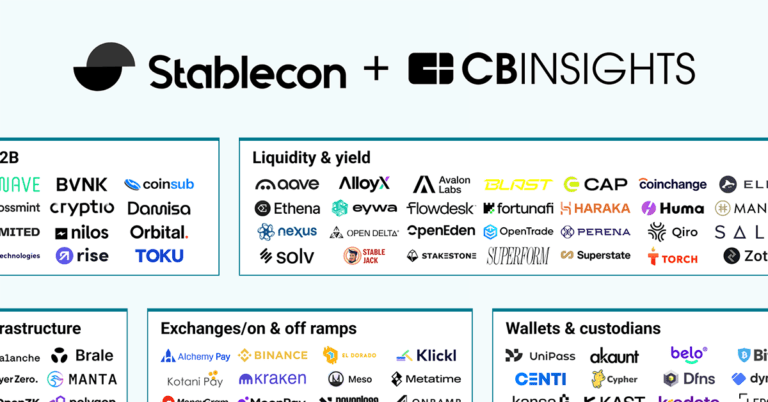
KAST
Founded Year
2023Stage
Seed VC | AliveTotal Raised
$10MLast Raised
$10M | 9 mos agoRevenue
$0000About KAST
KAST operates in the cryptocurrency and blockchain sector, offering services for spending stablecoins and crypto. The company provides digital and physical cards that allow users to spend their stablecoins and cryptocurrencies at various merchants, with integration into payment systems. KAST serves individuals who manage and spend their digital currencies. It was founded in 2023 and is based in Hong Kong.
Loading...
Loading...
Research containing KAST
Get data-driven expert analysis from the CB Insights Intelligence Unit.
CB Insights Intelligence Analysts have mentioned KAST in 1 CB Insights research brief, most recently on May 29, 2025.

May 29, 2025
The stablecoin market mapExpert Collections containing KAST
Expert Collections are analyst-curated lists that highlight the companies you need to know in the most important technology spaces.
KAST is included in 4 Expert Collections, including Payments.
Payments
3,199 items
Companies in this collection provide technology that enables consumers and businesses to pay, collect, automate, and settle transfers of currency, both online and at the physical point-of-sale.
Fintech
14,013 items
Excludes US-based companies
Stablecoin
450 items
Blockchain
9,147 items
Companies in this collection build, apply, and analyze blockchain and cryptocurrency technologies for business or consumer use cases. Categories include blockchain infrastructure and development, crypto & DeFi, Web3, NFTs, gaming, supply chain, enterprise blockchain, and more.
Latest KAST News
Jul 2, 2025
Binance to keep hundreds of staff in Singapore despite crackdown Crypto exchanges have long posed challenges for would-be regulators by leaving their base of operations ambiguous Published Wed, Jul 2, 2025 · 08:11 AM Follow Singapore is one of Asia’s foremost crypto hubs, with a licensing regime that global players such as Coinbase Global and OKX have used to set up regional bases. PHOTO: BLOOMBERG [SINGAPORE] The world’s largest digital assets exchange Binance, plans to keep hundreds of remote workers in Singapore, despite a crackdown on unlicensed crypto outfits in the city-state. The Monetary Authority of Singapore (MAS) recently announced a hard deadline of Jun 30 for crypto firms incorporated in Singapore and offering services offshore to cease activities, prompting top-10 exchange operators Bitget and Bybit to weigh shifting staff overseas. The new rules are expected to have a negligible impact on Binance’s operations in Singapore, according to sources familiar with the company’s operations who asked not to be identified discussing confidential information. Hundreds of Singapore-based employees working remotely for the exchange will not need to relocate, the sources said. More than 400 Binance workers label themselves as based in Singapore on LinkedIn, based on a Bloomberg News analysis. Binance had no comment on its operations in Singapore and did not specify whether it has an office in the city-state when asked by Bloomberg. The MAS referred to its earlier statements on the new rules. Crypto exchanges have long posed challenges for would-be regulators by leaving their base of operations ambiguous. Binance has never named a global headquarters. Its chief executive officer Richard Teng – a former director at the MAS – said in 2024 that the company had held talks with a number of jurisdictions on the matter, but in January, he described Binance employees as “remote-first”. A NEWSLETTER FOR YOU Sign Up Sign Up In a Jun 6 clarification to its initial announcement, the MAS said digital-asset firms offering services “solely to customers outside of Singapore” will need to be licensed from Jun 30 or “cease their regulated activities”. Binance is not licensed in Singapore and has been on an investor alert list there since 2021, meaning it cannot solicit customers from the city-state. Binance staff in Singapore are seen as shielded from the recent MAS notice, however, because they mainly focus on back-office activities including compliance, human resources, data analysis and technology, the sources familiar with the situation said. Working remotely, rather than in a permanent office, also helps to insulate them, the sources added. SEE ALSO Individuals or partnerships that operate from a place of business in Singapore or incorporated in the city-state and offering digital token services outside the country will fall under the new rules, the MAS said in its May 30 statement. But work done by an individual as part of their employment with a foreign-incorporated company that provides such services outside Singapore “would not, in itself, attract a licensing requirement” under the Financial Services and Markets Act (FSMA) 2022, the MAS said. “Place of business is a grey area,” said Chris Holland, partner at Singaporean consulting firm HM. “The definition of ‘place of business’ is broad under the FSMA. While the term will have a boundary, I would not encourage firms to engage people resident in Singapore and then rely exclusively on that definition to work remotely, assuming that it’s outside the remit of the new rules.” Crypto hub Singapore is one of Asia’s foremost crypto hubs, with a licensing regime that global players such as Coinbase Global and OKX have used to set up regional bases. But the city-state suffered a string of bruising blow-ups during the last industry downturn in 2022. Among those was Three Arrows Capital, a crypto hedge fund that imploded after a series of bad bets. Singapore’s status as a fulcrum for the industry is now being called into question, after the Jun 30 deadline sparked concerns of a crypto exodus. “There’s lot of uncertainty on Singapore’s stance on crypto,” said Raagulan Pathy, co-founder of Kast, a stablecoin startup. Cayman Islands-based Kast has hired 100 people in the past 12 months and had planned to shift internal operations staff, trading teams and other executives to Singapore while hiring 30 to 50 people there. Now, Pathy plans to set up a global office in Dubai instead. “Even though Singapore is merely plugging a regulatory loophole, the perception is it’s clamping down on crypto and that could push capital and talent out.” Pathy is a 12-year resident of Singapore and has no plans to move personally, he added, but has to “make hard choices about where to locate offices for Kast”. BLOOMBERG Share with us your feedback on BT's products and services
KAST Frequently Asked Questions (FAQ)
When was KAST founded?
KAST was founded in 2023.
What is KAST's latest funding round?
KAST's latest funding round is Seed VC.
How much did KAST raise?
KAST raised a total of $10M.
Who are the investors of KAST?
Investors of KAST include Peak XV Partners and HongShan.
Who are KAST's competitors?
Competitors of KAST include Fuze and 6 more.
Loading...
Compare KAST to Competitors
WageCan is a company focused on digital asset management within the cryptocurrency sector. It offers a platform for crypto debit cards that enables spending of Bitcoin, Ethereum, and various stablecoins in a secure manner. The company primarily serves individuals and businesses looking to manage and utilize digital currencies. It was founded in 2014 and is based in New Taipei City, Taiwan.

MoonPay provides a platform for buying, selling, and swapping cryptocurrencies. Its services include an interface for digital asset transactions, a wallet service, and support for viewing digital collectibles and NFTs. MoonPay serves individuals and businesses looking to engage with cryptocurrencies and Web3 technologies. It was founded in 2018 and is based in Dover, Delaware.
Deblock is a financial services company that integrates a current account with a non-custodial crypto wallet. The company provides a platform for users to deposit, withdraw, spend, and exchange Euros or cryptocurrencies, offering features such as an IBAN, instant transfers, and physical and virtual cards. Deblock serves individuals and businesses looking to manage both fiat and digital assets. It was founded in 2022 and is based in Paris, France.

Plutus is a financial technology company that connects traditional fiat currencies with cryptocurrencies. The company provides a platform where users can earn Pluton, a native cryptocurrency, through spending with a Visa debit card, and offers financial services, including a personal finance app and crypto wallet integration. Plutus serves the fintech and cryptocurrency sectors, targeting consumers interested in using cryptocurrency in their financial activities. It was founded in 2015 and is based in London, United Kingdom.

Ramp focuses on providing Web3 financial infrastructure within the cryptocurrency sector. It offers non-custodial services that enable users to buy and sell cryptocurrencies, facilitating the exchange between fiat currency and digital assets. Ramp's infrastructure supports businesses by integrating crypto onboarding tools, ensuring compliance, and providing a seamless user experience for transactions. It was founded in 2018 and is based in London, United Kingdom.

Transak is a global web3 infrastructure services provider specializing in fiat-to-crypto payment gateway solutions. The company offers a developer integration toolkit that enables users to buy and sell cryptocurrencies using various payment methods while ensuring compliance with local regulations. It was founded in 2019 and is based in New York, New York.
Loading...
